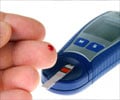A recent study published in The Lancet journal indicates that poor blood sugar control in type 1 diabetes could increase the chances for developing heart failure.
Type 1 diabetes occurs due to a decrease in insulin production by the pancreas. The patient usually suffers from the condition since childhood and has to take regular insulin injections to control blood sugar levels.Researchers studied the incidence of heart failure in 20, 985 patients from Sweden with type 1 diabetes. The patients included in the study were 18 years or older in age and were followed up for an average of 9 years.
The researchers found that hospital admissions with heart failure were four times more common in type 1 diabetic patients who had a very poor control of blood sugar as compared to those with good control. Blood sugar control was estimated by measuring hemoglobin A1c levels. Risk of heart failure also increased with age and duration of diabetes. It also affected these patients at a much lower age than the general population.
Other factors such as smoking, high systolic blood pressure, and a high body-mass index were also associated with an increased risk of heart failure. These factors can be modified with treatment doing so can reduce heart failure in these patients.
The study estimated heart failure only in patients admitted to hospitals. The actual incidence may have been much more if non-hospitalized patients with heart failure were also included in the study.
Thus, the researchers suggest that doctors should be vigilant and observe type 1 diabetes patients for heart failure from an early age. This is particularly important in patients with poor control of their blood sugar levels.
1. Marcus Lind et al. Glycaemic control and incidence of heart failure in 20 985 patients with type 1 diabetes: an observational study.� The Lancet 2011; 378 (9786): 140 � 146.















